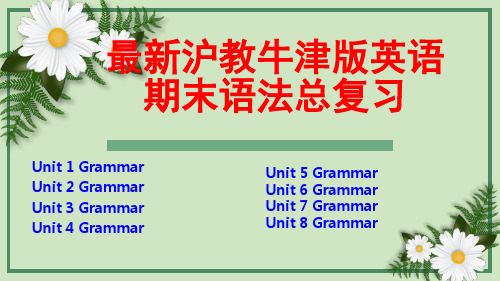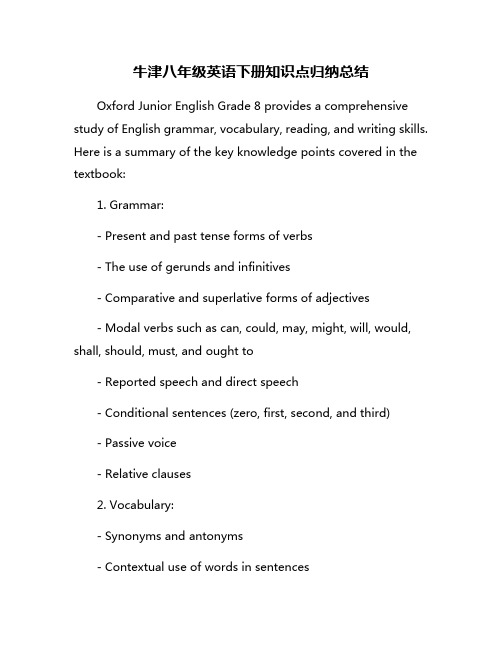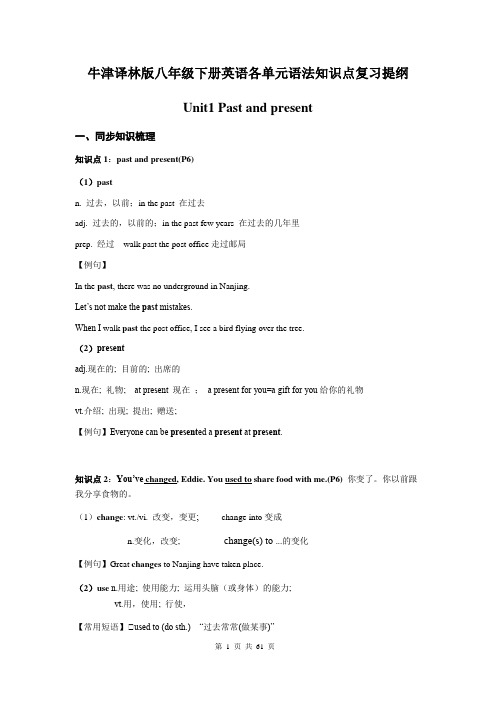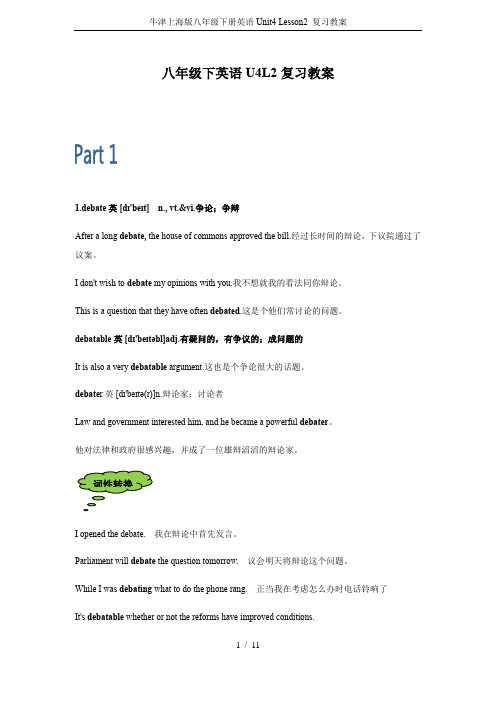牛津版八下英语语法总复习资料教师
最新沪教牛津版英语版英语八年级下册语法总复习

the Wolong Panda Reserve, because it allows people
___B___ closer to them.
A. get
B. to get
C. getting
D. got
【点拨】allow sb. to do sth. “允许某人做某事”。
13. (易错题) —Mr Wu has recommended many books.
Have you decided ___B___ first?
—Yes. The Little Prince.
A. how to read
B. which to read
C. when to read
D. where to read
【点拨】“特殊疑问词+动词不定式”的结构。
14.【 中考·青岛】Teachers expect all their students ___A___
五、短文填空。 stop, talk, offer, ask, keep, give, save, be, help, lose
Dear Dad, I’m writing this letter __to__ta_l_k__21 about a problem with
you. I can’t stop thinking about my uncle and how he died. In fact, I seriously want to ask you __to__s_to_p__ 22 smoking. Smoking is the second biggest cause of death in the world.
to music and she often goes to concerts. 2. Have you finished __r_e_a_d_in__g__ (read) the book? 3.【 中考·云南】The young should do meaningful things
牛津译林版八年级英语全册语法知识点总结

1.句子结构:a.主语+谓语+宾语b.主语+谓语+间接宾语+直接宾语c.主语+谓语+宾语+宾语补足语d.主语+谓语+宾语+宾语补足语+定语e.主语+系动词+表语f.主语+不及物动词2.时态:a.一般现在时:表示现在经常性、习惯性的动作或状态。
b.现在进行时:表示现在正在进行的动作。
c.一般过去时:表示过去发生的动作或状态。
d.过去进行时:表示过去其中一时刻正在进行的动作。
e.一般将来时:表示将来的动作或状态。
f.将来进行时:表示将来其中一时刻正在进行的动作。
3.语态:a.主动语态:主语是动作的执行者。
b.被动语态:主语是动作的承受者。
4.动词时态和语态的被动形式:a. 一般现在时的被动形式:am/is/are+动词的过去分词。
b. 一般过去时的被动形式:was/were+动词的过去分词。
c. 将来时的被动形式:will be+动词的过去分词。
d. 现在进行时的被动形式:am/is/are+being+动词的过去分词。
e. 过去进行时的被动形式:was/were+being+动词的过去分词。
5.情态动词:a. can:表示能力、允许和请求。
b. may:表示许可、可能性和祝愿。
c. must:表示肯定、必要性和推测。
d. should:表示建议、责任和承诺。
e. might:表示推测、可能和祝愿。
f. would:表示假设、请求和习惯。
6.虚拟语气:a.虚拟语气用于表达虚构、假设、愿望、建议等。
b. 虚拟语气主要涉及以下几个时态:一般过去时、现在将来时、与现在相对的过去将来时、would/could+动词原形。
7.上文一致性:a.当主句用一般现在时态表述,宾语从句中的谓语动词将会保持不变。
b.当主句用过去时态表述,宾语从句中的谓语动词将用相应的过去时态。
总结完毕,以上是牛津译林版八年级英语全册所涉及的主要语法知识点。
牛津译林版八年级英语下册全册词汇、句型、语法知识点及训练汇总

牛津译林版八年级英语下册Unit 1 Past and present词汇、句型、语法知识点及训练知识精讲一、必背词汇past n. 过去adj.过去的present n. 现在,目前just adv. 刚才since conj. 自……以来prep.自……以来ever adv. 曾经northern adj. 北方,北部的married adj. 已婚的,结婚的wife n.(pl. wives) 妻子block n.街区over prep. 在……期间pollution n. 污染;污染物factory n. 工厂waste n. 废料;废品realize (= realise )vt.& vi.意识到;实现improve vt.&vi. 改进,改善situation n. 形势,情况impossible adj. 不可能的before adv.以前,过去lonely adj. 孤独的,寂寞的anyway adv. 尽管,即使这样husband n. 丈夫interview n. 采访;会见yet adv. 还,仍recently adv.近来,最近environment n. 环境transport n.交通车辆,运输工具condition n. 环境,条件,状况return vi. 返回last adv.最近,上一次;最后abroad adv. 到(在)国外primary adj. 小学教育的;初级的communicate vt. &vi. 交流,交际exactly adv.(答语)正是,没错narrow adj. 狭窄的二、重点词汇1. present noun /ˈprez.ənt/1). something that you are given, without asking for it, on a special occasion, especially to showfriendship, or to say thank you(尤指表示友谊或致谢的)礼物,赠品例句:They gave me theatre tickets as a present.他们送给我戏票作为礼物。
牛津八年级英语下册知识点归纳总结

牛津八年级英语下册知识点归纳总结Oxford Junior English Grade 8 provides a comprehensive study of English grammar, vocabulary, reading, and writing skills. Here is a summary of the key knowledge points covered in the textbook:1. Grammar:- Present and past tense forms of verbs- The use of gerunds and infinitives- Comparative and superlative forms of adjectives- Modal verbs such as can, could, may, might, will, would, shall, should, must, and ought to- Reported speech and direct speech- Conditional sentences (zero, first, second, and third)- Passive voice- Relative clauses2. Vocabulary:- Synonyms and antonyms- Contextual use of words in sentences- Phrasal verbs- Idioms and expressions- Prefixes and suffixes- Homophones and homographs- Word formation (nouns, verbs, adjectives, adverbs)3. Reading:- Comprehension passages with different text types (narrative, descriptive, expository, persuasive)- Identifying main ideas and supporting details- Inference and predicting outcomes- Summarizing texts- Recognizing literary devices (simile, metaphor, personification, alliteration, onomatopoeia)4. Writing:- Paragraph and essay writing- Narrative, descriptive, and argumentative writing- Using appropriate linking words and phrases- Organizing ideas cohesively- Structure of a formal letter and email- Creative writing techniquesOverall, the Oxford Junior English Grade 8 textbook offers a well-rounded English language curriculum that helps students improve their language skills in grammar, vocabulary, reading, and writing. By mastering these knowledge points, students can better communicate and express themselves effectively in English.。
牛津译林版八年级下册英语各单元语法知识点复习提纲(全面!)

牛津译林版八年级下册英语各单元语法知识点复习提纲Unit1 Past and present一、同步知识梳理知识点1:past and present(P6)(1)pastn. 过去,以前;in the past 在过去adj. 过去的,以前的;in the past few years 在过去的几年里prep. 经过walk past the post office走过邮局【例句】In the past, there was no underground in Nanjing.Let’s not make the past mistakes.When I walk past the post office, I see a bird flying over the tree.(2)presentadj.现在的; 目前的; 出席的n.现在; 礼物; at present 现在;a present for you=a gift for you给你的礼物vt.介绍; 出现; 提出; 赠送;【例句】Everyone can be present ed a present at present.知识点2:You’ve changed, Eddie. You used to share food with me.(P6) 你变了。
你以前跟我分享食物的。
(1)change: vt./vi. 改变,变更; change into变成n.变化,改变; change(s) to ...的变化【例句】Great changes to Nanjing have taken place.(2)use n.用途; 使用能力; 运用头脑(或身体)的能力;vt.用,使用; 行使,【常用短语】①used to (do sth.) “过去常常(做某事)”批注:否定形式:didn’t use to / usedn’t to①get/be used to(doing sth. )“习惯于(做某事)【例句】He used to go fishing every Saturday. But since he changed his job, he’s barely(几乎不) had a chance. He thinks he’ll never be used to this busy lifestyle.【拓展】useful adj. 有用的;useless adj. 无用的知识点3:I first lived in the northern part of the town with my parents.(P8)【例句】Beijing is in the northern part of China.批注:注意in the north与in the northern part of 的同义句转换。
牛津上海版八年级下册英语Unit4 Lesson2 复习教案

牛津上海版八年级下册英语 Unit4 Lesson2 复习教案八年级下英语 U4L2 复习教案1.debate 英 [dɪ'beɪt] n., vt.&vi.争论;争辩 After a long debate, the house of commons approved the bill.经过长时间的辩论,下议院通过了 议案。
I don't wish to debate my opinions with you.我不想就我的看法同你辩论。
This is a question that they have often debated.这是个他们常讨论的问题。
debatable 英 [dɪ'beɪtəbl]adj.有疑问的,有争议的;成问题的 It is also a very debatable argument.这也是个争论很大的话题。
debater 英 [dɪ'beɪtə(r)]n.辩论家;讨论者 Law and government interested him, and he became a powerful debater。
他对法律和政府很感兴趣,并成了一位雄辩滔滔的辩论家。
词性转换I opened the debate. 我在辩论中首先发言。
Parliament will debate the question tomorrow. 议会明天将辩论这个问题。
While I was debating what to do the phone rang. 正当我在考虑怎么办时电话铃响了 It's debatable whether or not the reforms have improved conditions.1 / 11牛津上海版八年级下册英语 Unit4 Lesson2 复习教案改革是否改善了现状,这问题仍有争议。
A debater's highest criterion is reasoning.衡量辩论家的最高标准是推理能力。
八年级英语下册 Unit 1 Past and present重点语法和句型 牛津版

Unit 1 Past and present一. 教学内容:Unit 1 Past and presentwords, phrases and sentences二. 教学目标:掌握Unit 1的词汇及词性变化和课文中的重点词组、句型的结构和用法Unit 1 Past and present(一)基础词汇过去,往事 past目前,现在 present(n. 现在,通常与过去、将来相对应。
The past, the present and the future . 过去、现在和将来。
at present. 此刻、现在: I’m afraid I can’t help you just at present. ----- I’m too busy. 很抱歉,我现在帮不了你,----- 实在太忙了。
adj. 现在的。
the present day当今、现今。
Most young people enjoy listening to popular music the present day. )刚刚 just(just, adv. 刚才。
常用于完成时态,在美式英语中用于一般过去时。
)I have just seen John. 我刚才见到约翰了。
I just saw him. (a moment ago). ( U. S)我(几分钟前)看到他的。
( U. S)自……以来 since(since. 后面通常接点时间来表示一段时间。
例如:since 1984 自从1984年一直到现在。
since 3 days ago. 自从三天前一直到现在,也可以说成for 3 days 通常用how long 提问。
How long has your uncle lived here? Since 1980. )南方的 southern到……时 till已婚的 married(marry. vt. vi marry sb. 与某人结婚;嫁或娶某人。
Unit5单词以及语法点梳理牛津译林版八年级英语下册

dying adj. 奄奄一息的death n. 死亡The hero’s death made us very sad. 这个英雄的死亡让我们很难过。
16. explain v. 解释,说明Can you explain why you were late? 你能解释一下你为什么迟到吗?【拓展】explanation n. 解释,解说,说明She told the court she would give a full explanation of the prosecution’s decision on Monday.她告诉法庭她会在星期一对原告方的决定作出全面解释。
17.against prep. 相反,反对e.g. No one is against this proposal.没有人反对这个提议。
That's against the law,那是违法的。
辨析:against 与for两者都可表示方向,下图指明了两者的区别:for against●→ ←○ ←● ○→向着(赞同)逆着(反对)e.g. The Prince is making for the open sea while the princess is against. 王子号向着大海驶去,而公主号恰好驶回。
18. go off突然作响When the fire alarm went off, we all moved to the playground.消防警铃突然作响,我们都逃到了操场上。
【拓展】★go off变质= go badI didn’t put the food in the fridge in time so it went off. 我没有及时把食物放进冰箱以致它变质了。
★go off爆炸The bomb was exploded under controlled conditions. 炸弹在受控条件下被引爆了。
- 1、下载文档前请自行甄别文档内容的完整性,平台不提供额外的编辑、内容补充、找答案等附加服务。
- 2、"仅部分预览"的文档,不可在线预览部分如存在完整性等问题,可反馈申请退款(可完整预览的文档不适用该条件!)。
- 3、如文档侵犯您的权益,请联系客服反馈,我们会尽快为您处理(人工客服工作时间:9:00-18:30)。
现在完成时的重点和难点一、现在完成时的“完成用法”和“未完成用法”1. 现在完成时的" 完成用法"现在完成时的"完成用法"指的是动作发生在过去某一时刻并已结束,但该动作对现在产生了影响,与现在情况具有因果关系。
例如:He has turned off the light.他已把灯关了。
(动作结束于过去,但说明的是现在的情况--灯现在不亮了。
)现在完成时"完成用法"的特点是动作不延续,因此,该时态只能与表示不定的过去时间状语(如:already,yet,before,recently 等)、频度时间状语(如:never, ever, once等)、包括现在时刻在内的时间状语(如:this morning / month /year...,today 等)连用。
例如:Have you found your pen yet?你已找到你的钢笔了吗?2. 现在完成时的"未完成用法"现在完成时的"未完成用法"指的是动作开始于过去某一时刻,一直延续到现在,或可能还要继续下去。
例如:He has lived here since 1978自. 从1978 年以来,他一直住在这儿。
(动作起始于1978 年,一直住到现在,可能还要继续住下去。
)I have bee n in the army for more tha n 5 years 我在部队已经呆了五年多了。
(动作开始于 5 年前,一直延续至今,有可能还要继续下去。
)此种用法的句中常需一个表示一段时间的状语(由since或for引导),或表示与现在时刻相连的时间状语(如:up tonow, so far到目前为止)等。
例如:I have heard nothing from him up to now.到目前为止我没有他的任何消息。
注意:(1)现在完成时的未完成用法只适用于延续性动词,不可用于终止性动词,即瞬间完成或延续时间很短的动词。
如:come,go,arrive,leave,join ,become,die 等。
(2) 现在完成时常见两种句型:①主语+have / has been+for 短语②It is +一段时间+since 从句例如:He has been in the League for three years或It is three years since he joined the League他入团已三年了。
3、延续性动词和终止性动词的概念英语中,动词按其动作发生的方式、动作发生过程的长短,可分为延续性动词和终止性动词。
延续性动词表示能够延续的动作,这种动作可以延续下去或产生持久影响。
如:learn,work,stand,lie,know, walk, keep, have, wait, watch, sing, read, sleep, live, stay 等。
终止性动词也称非延续性动词、瞬间动词或短暂性动词,表示不能延续的动作,这种动作发生后立即结束。
如open, close, finish, begin, come, go, arrive, reach, get to, leave, move, borrow,buy 等。
4、延续性动词的用法特征1. 延续性动词可以用于现在完成时,其完成时态可与表示"段时间"的状语连用。
表示"段时间"的短语有:for two years,during the past three years,since last year,how long 等。
如:I have lear ned En glish si nee I came her自从我来至U这儿就学英语了。
2. 延续性动词不能与表示短暂时间的"点时间"状语连用。
如:It raind at eight yesterday morning•(误)rain为延续性动词,而at eight表示”点时间",前后显然矛盾。
如果用延续性动词表示一瞬间的动作,可以借助come, begin, get 等终止性动词来表示。
上句可改为:It bega n to rain at eight yesterday mornin g.(正)又如:-When did you get to know Jack?-Two years ago.-Then you've known each other for more than two years.-That's right.5、终止性动词的用法特征1. 终止性动词可用来表示某一动作完成,因此可用于现在完成时。
如:The train has arrived.火车到了。
2.终止性动词表示的动作极其短暂,不能持续。
因此,不可与表示一段时间的状语连用(只限肯定式)。
如:(1)他死了三年了。
误:He has died for three years.正:He has been dead for three years正: He died three years ago.正:It is three years since he died正: Three years has passed since he died.(2) 他来这儿五天了。
误:He has come here for five days.正:He has been here for five days正:He came here five days age正:It is five days si nee he came here正: Five days has passed si nee he came here.、)(2)句中的die、come 为终止性动词,不能与表示"段时间"的状语连用。
那么,应如何正确表达呢?可以采用下面的四种方法:(1) 将句中终止性动词转换为相应的延续性动词,如上面两例中的第一种正确表达方式。
下面列举几例:leave宀be away, borrow 宀keep, buy 宀have,begi n/start — be on, die — be dead, move to — live in,fin ish — be over, joi n member of, ope n sth. —keep sth. ope n, fall ill —be ill, get up —be up, ca cold —have a cold(2) 将句中表示"段时间"的状语改为表示过去确定时间的状语,如下面两例中的第二种正确表达方式。
(3) 用句型"It is+段时间+sin ce...'表达原意,如上面两例中的第三种正确表达方式。
(4)用句型"时间+has passed+since...表" 达原意,如上面两例中的第四种正确表达方式。
3. 终止性动词可用于现在完成时否定式中,成为可以延续的状态,因而可与表示一段时间的状语连用。
如:He hasn't left here since 1986.I haven't heard from my father for two weeks.4. ................................ 终止性动词的否定式与until/till 连用,构成"not+ 终止性动词+until/till..." 的句型,意为"直到……才。
女口:You can't leave here until I arrive直到我到了,你才能离开这里。
I will not go to bed until I finish drawing the picture tonight.今天晚上直到我画完画,我才上床睡觉。
5. 终止性动词可以用于when 引导的时间状语从句中,但不可以用于while 引导的时间状语从句中。
when 表示的时间是"点时间"(从句谓语动词用终止性动词),也可以是"段时间"(从句谓语动词用延续性动词)。
而while表示的是一个较长的时间或过程,从句谓语动词用延续性动词。
如:When we reached London, it was twelve o'clock. (reach 为终止性动词)Please look after my daughter while/whe n we are away. (be away 为延续性动词短语)6. 终止性动词完成时不可与how long 连用(只限于肯定式)。
如:误:How long have you come here正:How long have you been here?正:When did you come here?二、现在完成时与一般过去时的区别1. 一般过去时表示过去某个时间发生的事、存在的状态或经常发生的动作。
说话的侧重点只在于陈述一件过去的事情,不强调对"现在"产生的影响。
如:He visited Guilin in 1998.他1998年参观过桂林。
(只说明去桂林的时间)2. 现在完成时表示动作发生在过去,对现在造成了影响或产生了结果。
不与确定的过去时间状语连用。
如:Jill has bought a new computer吉尔买了一台新电脑。
(着重点是现在有了一台新电脑)3. 两种时态的区分(1) 一般过去时的谓语动词用过去式,而现在完成时的谓语基本构成是"助动词have /has+过去分词"。
如:The film started at 7 o ' clocHe has been a teacher for many years.(2) 一般过去时通常与表示过去的时间状语连用。
如:yesterday, last week, two years ago, just now,in 2002等;而现在完成时则常与just,already,ever,never 等副词和thesedays,this week,since...,for..等. 表示一段时间的状语连用。
看看以下的几组句子,有什么区别?①Have you seen the film?(A) Did yousee the film?(B)[说明]你看过这部电影吗?(A)句强调的是被问者对剧情是否了解;(B)句强调的是看这部电影的动作是否发生过,并不强调是否知道其内容。
